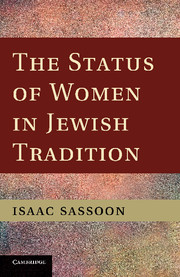Book contents
- Frontmatter
- Contents
- Preface
- Acknowledgements
- Glossary
- Abbreviations
- PART I MONOGAMY
- PART II COMMANDMENTS (MIṢVOT)
- PART III INTRINSIC EQUALITY
- Conclusion
- Bibliography
- Index of Authors (Medieval & Pre-modern)
- Index of Citations from Rabbinic Literature
- Index of Names (Hebrew Bible)
- Index of Names (Talmudic)
- General Index
PART II - COMMANDMENTS (MIṢVOT)
Published online by Cambridge University Press: 01 June 2011
- Frontmatter
- Contents
- Preface
- Acknowledgements
- Glossary
- Abbreviations
- PART I MONOGAMY
- PART II COMMANDMENTS (MIṢVOT)
- PART III INTRINSIC EQUALITY
- Conclusion
- Bibliography
- Index of Authors (Medieval & Pre-modern)
- Index of Citations from Rabbinic Literature
- Index of Names (Hebrew Bible)
- Index of Names (Talmudic)
- General Index
Summary
Introduction
R. Hananiah son of Aqashia said the Holy One blessed be He wanted to let Israel gain merit therefore He gave them Torah and miṣvot in abundance as it says [Isa 42:21] Hashem is pleased for the sake of his righteousness to magnify Torah and make it glorious (Mishnah end of Makkot).
Advisedly do we open this discussion of women's miṣvot with R. Hananiah's pan-Israelite homily, whose latent egalitarianism can so easily slip by without notice. Two postulates seem to be axiomatic for R. Hananiah: 1) merit is something desirable; 2) studying Torah and fulfilling miṣvot are the means through which merit is earned. Proceeding from these postulates, R. Hananiah discerns munificence in God's showering Israel with opportunities to gain merit. No, not merely to Israel's menfolk were Torah and miṣvot galore made available, but indiscriminately to all Israel.
At the opposite pole to R. Hananiah we find a sprinkling of texts that appear to strip women of all miṣvot. Representative of this exiguous yet distinct group of texts is the one occurring at Bava Qama 15a. The Mishnah had ruled that “women are included in the laws of damages”. The Gemara enquires as to the scriptural source for this mishnaic ruling. What it discovers is that no fewer than three scriptures (Num 5:6, Ex 21:1; Ex 21:29) had been adduced by earlier rabbis. Initially, a threefold proof seems excessive to the Gemara – until it resolves that:
All three [scriptural derivations] are necessary. If we had only the first [Num 5:6 which deals with ḥaṭṭot ha-adam] we might have said it is there that out of pity the Merciful One provides her the means of atonement, but civil law in general would apply to a man who is involved in (lit. who is a son of) monetary matters but not to a woman. […]
- Type
- Chapter
- Information
- The Status of Women in Jewish Tradition , pp. 39 - 43Publisher: Cambridge University PressPrint publication year: 2011



